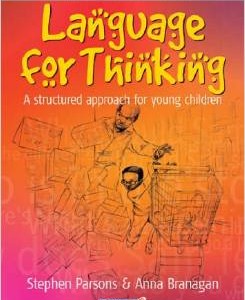Language for Thinking: A Structured Approach for Young Children
For the majority of children developing verbal reasoning skills comes naturally, while others may find it more of a challenge.
If a child who is recognised as having a specific language impairment, delayed language skills, Autistic Spectrum Conditions (including Asperger’s Syndrome), or moderate learning difficulties developing verbal reasoning skills can seem almost impossible.
What is the approach?
Language for thinking has been specifically created to teach and develop children’s language from the abstract to the concrete.
This book is based around 50 verbal and picture scenarios that can be used with a wide range children, of varying ages and abilities. Above all this book is practical to use not only in the classroom but with children on an individual basis too.
The question sheets have been carefully structured to improve a child’s development in terms of verbal reasoning and thinking skills. The parallel assessments of written and spoken language can be used to assess each child on an individual basis, therefore each child will start at the right level for them, with their progress being monitored by worksheets and score forms, which are included.
The skills which a child can gain include:
- Improved verbal reasoning skills
- Improved thinking skills
- Develop language skills
- Improved Spoken & Written language
Who can the approach be used by?
Language for thinking can be used with children with;
- Delayed language skills
- Autistic Spectrum Conditions (Asperger’s Syndrome)
- Pragmatic Language Impairment
- Moderate Learning Difficulties
Language for thinking is used with a range of pupils who find verbal reasoning, language skills, and the spoken and written language difficult.
Children who often benefit from this system have:
- Difficulties in expressing themselves verbally
- Difficulty with the spoken and written language
- Difficulty with reading
Who can deliver the approach?
This approach can be implemented by therapists, school/support staff and family members.
Further Information
If you are interested in using language for thinking with your student or service user it is best to have their needs assessed. A Speech and Language Therapist or licensed tutor will provide training and support you to set up this approach.









